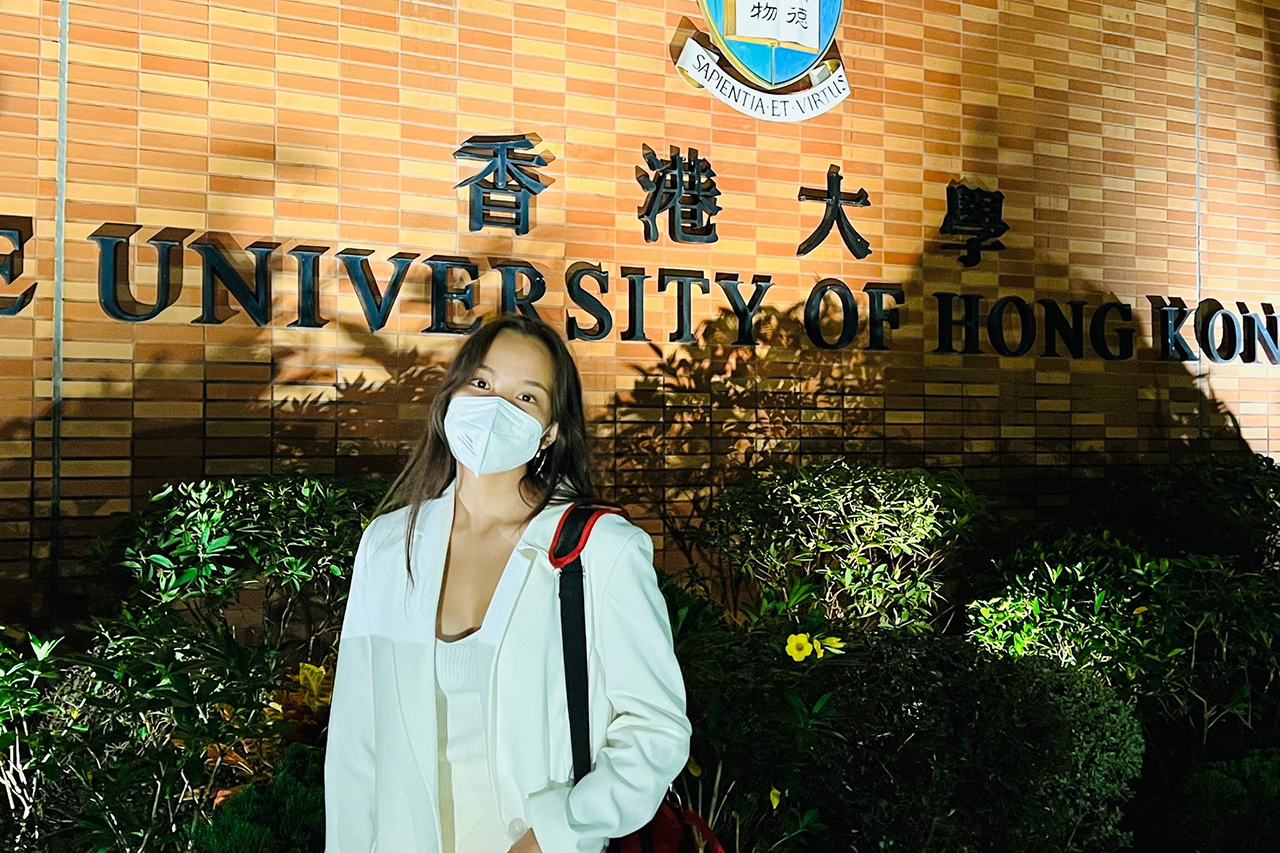- How well are you adjusting to university learning?
- What are your goals? Do you have an academic plan?
- U life can be overwhelming. Are you using your prioritizing and time management skills well?
1. Attend orientations
Welcome to HKU! You are going to start a most exciting academic journey. HKU is famous for its rich and vibrant student orientation activities, but academic orientation is equally, if not more, important too. So be sure that you attend the orientation session organised by your Faculty and (for some of you) School / Department. Check your HKU email account or here ![]() to find out the date and time of the orientation. You should also check the range of activities under the Future Readiness Initiative
to find out the date and time of the orientation. You should also check the range of activities under the Future Readiness Initiative ![]() which are designed specifically for new students.
which are designed specifically for new students.
2. Meet your advisers
Unlike in high school, as a university student you are expected to make a lot of study-related decisions. Your Faculty Academic Adviser (FAA) is here to support your transition to the University, and guide you in developing your academic goals and study plan. Some Faculties will ask you to sign up for your FAA; some will assign one to you. If sign-up is required, remember to complete it within the sign-up period. You can check who your FAA is in SIS and are encouraged to meet with him / her whenever you need academic advice in your first year.
Besides FAA, there are other advisers to help you: Temporary Academic Adviser (TAA), Faculty Student Adviser (FSA), Residential Student Adviser (RSA). Check this video to see the different types of support they can provide to you.
3. Understand your curriculum and how to select courses
HKU has more than 70 undergraduate curricula, each with their unique curriculum requirements. These requirements may change from year to year. So don’t just rely on your friends, senior students or your orientation leaders to understand what courses you need to enrol – check it yourself. Pay special attention to language, common core, pre-requisite and other non-credit bearing requirements. When referring to syllabus and regulation, remember to consult relevant documents of your cohort.
4. Get familiar with the learning resources at HKU
Different students have different study pace and styles, therefore besides lectures and tutorials, the University offers a lot of optional learning resources that you can turn to in case of need.
- The CAES
 offers Communication Support Services
offers Communication Support Services  for students who have difficulties in using English as medium of learning.
for students who have difficulties in using English as medium of learning. - The SMLC
 offers a variety of European and Asian Language Courses.
offers a variety of European and Asian Language Courses. - The Library also has an examination database (http://find.lib.hku.hk/record=HKU_IZ61512022570003414
 ) which provides full text to some HKU past examination papers to facilitate your revision.
) which provides full text to some HKU past examination papers to facilitate your revision.
5. Devise your academic and study abroad plan
Despite being a first-year student, it is important for you to develop a well-structured academic study plan over your whole study period NOW. You need to have an overall picture of how to fit in the different opportunities (e.g. study abroad, internship, service learning, undergraduate research etc.) to your study plan. Check with your FAA in case of doubt.
You may also need to plan how to spend your first summer in HKU. To enrich your experience during university life, you may enrol for summer abroad programme, or join a service trip, or find a summer job. Start to think about it now. AASO has an academic planning sheet to guide you. Download it here.
6. Explore different study pathways
First Major in Home Faculty
For those of you who need to select a primary major, explore the different options offered by your Faculty. It is important to keep an open mind! There might be some academic disciplines which you currently have no idea about, but after gaining a better understanding, you may eventually find them interesting. Discuss with your FAA if in doubt.
Second Major / Minors in Home or Non-home Faculties
You may also select second major / minor if you wish. HKU has a vast array of choices, across Faculties, for you. Check the list here. You may obtain more information of these majors and minors in AASO’s Major and Minor Week, held jointly with different Faculties and CEDARS (Careers and Placement) in January each year. Stay tuned for the email announcement.
To get started, take a look at the 5 Steps to Major Minor Selection. There are indeed many ways to find out whether these subjects suit your interests / abilities. You may sign up for one or two courses in year one, or request to talk with a Temporary Academic Adviser (TAA) who teaches the subject. Within 24 hours of your request, you will receive an email notification with information of the TAA assigned to you.
Consider Relevant Factors in Major Selection
“I am really interested in this subject, but what job can I pursue with this major?” Has this question come across your mind when you look at the list of available study choices? Career consultants at CEDARS have some advice for you. Click the questions to read more. You may also make an appointment ![]() with them for further exploration.
with them for further exploration.
What Is the Relationship between Careers and Studies?
The relationship between a career and studies varies among students. For students who want to pursue a career in a professional field that requires specialised training and qualifications, the choice of major is a straightforward process.
On the other hand, there are many career options which do not need a professional degree, where employers look for other attributes beyond simply the discipline of studies. In such cases, the degree is not necessarily related to careers. Students are advised to research job functions and requirements of different career options, gain relevant work experience, and develop different transferable skills and knowledge from their studies and extracurricular activities so that they can apply them in different industries and work settings.
Should Students Select Their Major Based on Employment Prospects? What Should They Consider?
Employment prospects is only one of the many factors to consider when selecting a major. The job market is changing more quickly nowadays, and it is becoming more difficult to forecast the prospects of different industries and job roles. It is therefore important for students to consider other aspects when deciding their major:
- Personality and Preferences: Our personality and preferences are closely related to our work and communication styles, which help determine the work nature and environment that suit us best. Having such self-understanding abilities would help students decide on a major that paves the way for their prospective career paths.
- Interests and Passion: If students are certain about their interests and passion in a particular career, they should go for a major / minor that would prepare them for that specific field. With passion, students are likely to be more engaged and participative in learning, resulting in a more solid foundation and academic success. For students who need more time to discover their career direction, no matter what major / minor they pursue, they should try out different activities to gain more exposure, and to explore their interests and career goals.
Would Employers Consider Candidates with Double Majors as More Competent?
Based on our interaction with employers, students with a double major may give employers an impression that they have stronger academic or intellectual abilities, but does not necessarily make them more qualified than other candidates with a major and a minor or only a major. Employers will look for answers from students during the screening and interview process to questions like — “Do candidates possess the relevant knowledge and skills for the job? “— The key is whether the major / minor studies provide a positive and persuasive reflection on candidates’ qualities, including interest and passion, knowledge, and hard and soft skills.
Nowadays, companies need employees who are able to bring in different perspectives by thinking out of the box. Indeed, some major corporations and professional firms are keen to recruit students / graduates from a variety of disciplines to diversify their talent pool and create more dynamics. More jobs are now open to students from all disciplines of study.
7. Balance studies, activities and sleep
Your senior peers may have already told you that HKU has an extraordinarily large variety of extra-curricular activities, and that it is important for you to participate in some of them. Yes, joining some of these activities will not only help you develop friendships, but also help you sharpen your soft skills (e.g. event organisation, social awareness etc.), After all, university life is not just about studying.
However, it is also very important for you to strike a balance between studies and other activities (such as hall activities). Learn time management / self-management skills from CEDARS ![]() if necessary. While some students manage both studies and activities well, nevertheless, there are also students who fail their academic studies because of over-commitment in student activities. You don’t want to be one of them!
if necessary. While some students manage both studies and activities well, nevertheless, there are also students who fail their academic studies because of over-commitment in student activities. You don’t want to be one of them!
Tips
- Register for courses – You are required to register for courses for BOTH semesters in the August registration. However, summer courses can only be registered during the Add / Drop period in Semester 2 and course selection period in June. Don’t miss the enrolment periods! Not sure about how to do it? Read the tips
 we prepared for you!
we prepared for you! - Don’t commit plagiarism – Plagiarism is defined as the unacknowledged use, as one’s own, of work of another person, whether or not such work has been published. It is a very serious academic offence and the University does not allow or tolerate plagiarism. Learn more about it

- Make your own study plan – Don’t blindly follow advice from your peers whose circumstances may differ from yours. There is no “one-size-fit-all” thing in University. Find your own purpose, study method and style.
- Find out requirements for your desired major – Some programmes have a selection process for the primary major (e.g. BEng, Entrepreneurship, Design and Innovation of BBA). You may need to devise a Plan B (i.e., what courses to take in year 1 in case you are not accepted by your desired major in year 2).
Stories
Adiya Yerenova (BSc, Year 1)

“Strength and growth come only through continuous effort and struggle” – Napoleon Hill.
I am planning to major in Molecular Biology & Biotechnology, and minor in Finance. Before arriving in Hong Kong, I set my mind that on a daily basis we are going to be challenged to learn, practice and excel. HKU implements the continuous assessment method, to raise future leaders and experts in different fields. The curriculum is diverse and comprehensive, to ensure that a student has a deep understanding of the program, which is supposed to be challenging and demanding. Therefore, the university environment provides all the necessity to focus on goals and aspirations. If one struggles with studies, the professor and staff are supportive and student-oriented.
For those who are motivated to study or work hard, the place thrives on offers and it is an ideal place for a truly unique experience. HKU understands the importance of raising well-rounded students, and promotes different clubs, provides opportunities and supports initiatives of students. The AASO website provides all of the information that a student can have, and offers one-on-one consultation for further assistance.
Studying at HKU is about finding a balance between your studies and the extracurricular activities, establishing your goals, following your inspirations and trying yourself in numerous fields. HKU has a perfect environment to make mistakes, to ask questions and to grow side by side with your peers. The ambitious and hardworking students at HKU create a friendly collaboration and cooperation to strive for the best.
Fu Hoi Yiu (BEng, Year 1)

Entering college is like going to Disneyland. There are a bunch of amazing things that I am not familiar with. The students, the teachers, and of course, the environment are new to me. No doubt, it is easy to get lost in such a massive and fascinating place during the first year.
Transiting from high school, adapting to the new teaching approaches, balancing study and life, and establishing connections have always been challenging for me as a student returning to Hong Kong after studying abroad. My experience so far, throughout the first semester, is just like taking the amusement park rides, encountering different emotions and handling different tasks each day. It could make me feel a mixture of all the sentiments – intimidating, worrying, exciting, feeling stressed.
Thanks to my course mates and the advisers from AASO, they always try their best to accompany me. They make my college journey more enjoyable and smoother. Whenever I need advice and encouragement, they are the ones I seek help and assistance. Whenever I feel scared, they always listen to me when I am yelling or in trouble. Whenever I feel puzzled, they guide me like a GPS orienting me along the way.
This is just the beginning of my journey as an undergraduate student. I believe there are more awaiting ahead of me.




